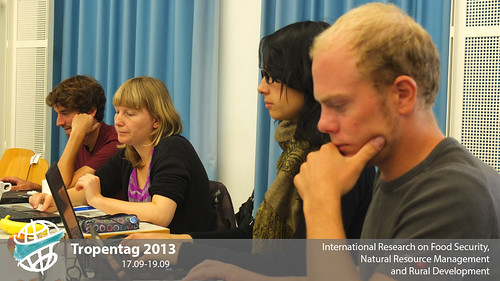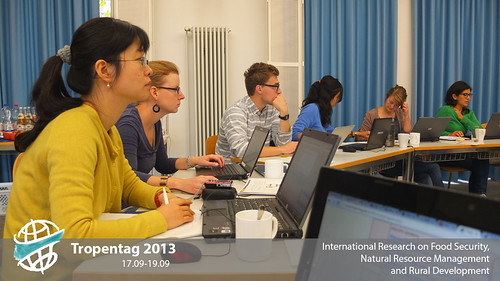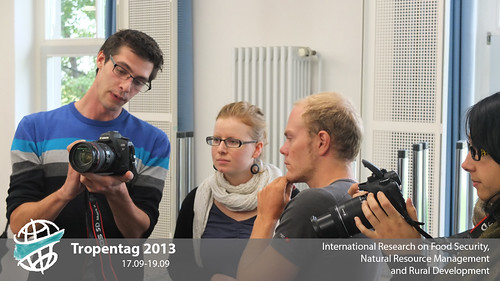Blogs
Student Reporters Training Day1
Sun, 09/15/2013 - 14:09 — Pamella Ogada2 MSc Graduates from the University of Hohenheim wins the prestigious Hans H. Ruthenberg Award
Thu, 10/04/2012 - 15:18 — Minette Flora M...
Lilli Scheiterle’s MSc thesis entitled “Opportunities and Challenges in the Production of Maize in Northern Ghana”and Athena Birkenberg’s “Forest Access and Governance: A Case Study on Karen Community Forestry in Chiang Mai Province, Northern Thailand”, both graduates from the University of Hohenheim wins the Hans H. Ruthenberg Award for Graduates 2012. This award is given to excellent young scientists whose topics are 1) highly relevant and discussed, 2) innovative which uses new methodological and theoretical trends in research, 3) sound and has a critical analysis of the data, and 4) a policy relevance of the recommendations specifically to developing countries.
Part 2: Interview with Athena Birkenberg
How do you feel right now?
I am really honored and I felt even more honored after the laudation because I just realized what the award really means and the reasons why the award was given to me.
What were the challenges you faced in the field?
2 MSc Graduates from the University of Hohenheim wins the prestigious Hans H. Ruthenberg Award
Thu, 10/04/2012 - 15:12 — Minette Flora M...
Lilli Scheiterle’s MSc thesis entitled “Opportunities and Challenges in the Production of Maize in Northern Ghana”and Athena Birkenberg’s “Forest Access and Governance: A Case Study on Karen Community Forestry in Chiang Mai Province, Northern Thailand”, both graduates from the University of Hohenheim wins the Hans H. Ruthenberg Award for Graduates 2012. This award is given to excellent young scientists whose topics are 1) highly relevant and discussed, 2) innovative which uses new methodological and theoretical trends in research, 3) sound and has a critical analysis of the data, and 4) a policy relevance of the recommendations specifically to developing countries.
Part 1: Interview with Lilli Scheiterle
How do you feel right now?
I am honored. I was very excited on stage when I was presenting while at the same time challenged with the vast number of people in the auditorium. It is my first time to have this so much crowd. I still feel very happy until now.
What were the challenges you faced in the field?
There are phases where you ask yourself, “Am I doing the right thing? Is my research useful? Will my data be used statistically?” . There are moments where you doubt – but you have to make a decision – stand by that decision and justify why you do it.
What is the benefit of the award to you? Any plans for a PhD?
Africa's most valuable innovation in agriculture
Sat, 09/29/2012 - 18:17 — De-Registered User
The Joint Learning in Innovation Systems in African Agriculture (JOLISAA) program, shares recent experiences on innovation processes involving multiple stakeholders and types of knowledge.
Innovation Systems (IS) perspective inspires the framework of the JOLISAA research. IS stresses that the flow of technology and information among stakeholders is key to innovative processes. The project uses several avenues (inclusion/exclusion criteria, storyline, common underlying concepts, and iterative processes) to identify relevant innovations for deeper assessment and joint learning. JOLISSA lists selected innovations in three national inventories (Benin, Kenya, and South Africa).
Jointly, practitioners and researchers assess 13 cases from the existing national inventories. The key steps in this collaborative case assessments are: i) planning meetings, ii) focus group discussions, iii) multi-stakeholders feedback, and iv) literature review.
Population density and human pressure on forest are not correlated says Mr. Joachim Schmerbeck from Teri University, India
Wed, 09/26/2012 - 09:21 — De-Registered User
The Forestry session of the Tropentag 2012 was moderated by Mr. Johannes Dietz from the World Agroforestry centre (ICRAF), Kenya.
There were four presentations in the session of which Mr. Joachim Schmerbeck was the first speaker. He presented the findings of his research on the topic can development interventions reduce human pressure on forest? a case study from a long term observation in India.
He explained that various researchers have tried over the years to determine the relationship between population and forest degradation in an area with some concluding that there is no relationship while others reported a positive relationship. The objective of his research was to determine this relationship by using long term observation. The study lasted for 21 years in the Kadavakurichi area in Tamil Nadu.
In 1991, it was found that 1,707 people entered the forest on the seven days of survey, most of them for grazing, hunting, collection of fuel wood, manure and medicines. A total of 22,918 heads of livestock entered the forest of which almost 50% were from outside the study area.
In 2012 the observation changed from what was found in 1991. 37% less people were found entering the forest. The main change was found among people collecting fuel wood and other products while there were almost no changes in number of people entering the forest for grazing.
Mr. Schmerbeck concluded that,
DAAD Alumni back in Germany for the Summer School
Wed, 09/26/2012 - 00:36 — Minette Flora M...
Alumni from various countries around the globe with professional background relating to agriculture and environmental resource management come together and participate in the Summer School program funded by the Deutsch Academic Exchange Service (DAAD).
Two universities in Germany organized and hosted the event from the 11th until the 18th of September 2012. Specifically, the Justus Liebig University Giessen group deals on the theme “Handicaps and Advantages in the Tropics: Current Aspects in Teaching Results gained from Research” while the group from the University of Hohenheim focused on “Tropical Agrobiodiversity as a guarantor for sustainable food security“.
The aim of the program is to exchange knowledge and experiences among the participants. Simultaneously, it also intends to foster networking like the development of joint research projects. Within the 8 day period, the activities of the two groups include excursions, lectures and alumni seminars.
After the end of the summer school, the two groups meet together at the Tropentag to gather more insights on the latest debate and researches related to the tropics and present their findings and recommendations to the plenary on the 21st of September 2012.
 Photo of the organizers in Uni Giessen
Photo of the organizers in Uni Giessen
 Photo of the organizers in Uni Giessen
Photo of the organizers in Uni Giessen
Do not miss: Call for innovative technology in Asia.
Sun, 09/23/2012 - 14:56 — De-Registered User
The Innovation Network for Food Security and Poverty Reduction(SATNETasia), funded by the European Union, strengthen the south-south dialogue and promotes sustainable agricultural technologies.
“SATNETasia is still looking for promising innovations, do not hesitate to contact” says Simone Kriesemer at the oral session titled "knowledge, learning and extension", Tropentag 2012. In this research program, scientists develop a framework to identify agricultural innovations that are sustainable, productivity enhancing, and suitable to the poorest.
The research program evaluates technologies based on an analytical hierarchy process. Multiple criteria categorized into environment, economy, society, and technology composes this decision making tool. For assessment of relevant technologies, one indicator, the composite sustainability development index, is calculated out of the evaluated criteria.
The index enables selection of best innovation according to the overall objective (i.e. a sustainable technology). Relevant technology are to be promoted by means of fact sheets and creation of a data base.
East Africa: the center of attention on animal breeding and health researches
Sat, 09/22/2012 - 16:03 — Minette Flora M...
Five young scientists in the Tropentag 2012’s oral presentation on animal breeding and health focused their empirical research in East Africa.
On animal breeding and genetic resources
Samuel Mbuku identified management strategies for small ruminants among pastoralists in Semi-Arid Kenya in order to optimize and expand the existing community based breeding programs in the country. Similarly in Kenya, T.O Okeno proposed an alternative breeding program of indigenous chicken that is more economically viable for smallholder chicken breeders. Moreover, Charles Moses Lyimo assessed the genetic diversity of five Tanzanian chicken populations and traced their history.
On animal health and veterinary services
Anne Fischer traced the origin of “Mycoplasma mycoides cluster”, a pathogen or parasite that attacks and causes diseases to goats, sheep and cattle particularly in East Africa. She argued that a comprehensive overview of the evolutionary history of the said cluster is still missing and genetic relationships between populations is still lacking. Meanwhile, John Ilukor analyzed the animal health service delivery in Uganda and proposed specific government interventions to improve their services.








